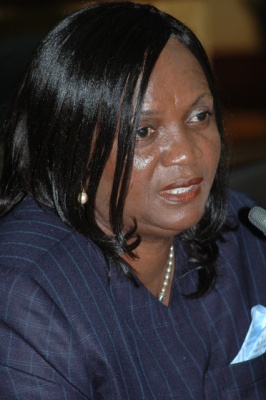Regional News of Thursday, 11 October 2012
Source: GNA
Legal education necessary to build the requisite capacity - CJ

The Chief Justice, Mrs Georgina Theodora Wood, on Thursday applauded the cooperation between the Ghana Shipper’s Authority (GSA) and the Judicial Training Institute in the continuing legal education to build the requisite judicial capacity with the needed expert knowledge and skills in the judiciary.
“Now that Ghana has joined the league of oil exporting nations and our ports and entry points have witnessed significant increase in the volumes of cargo passing through them, there is bound to be an increase in problems of economic activities and hence the necessary skills are needed to determine such cases,” she said.
The Chief Justice said the carriage of goods by the various modes of transportation which was associated with maritime disputes in the international transactions would witness an increase and therefore a credible, capable, ready and vibrant judiciary was needed in that direction.
This would help the judiciary to be strong and united to resolve dispense justice impartially and without fear or favour, to execute their mandate without fear of intimidation and to freely express their professional opinions within the confines of the law.
The Chief Justice said this when she opened the Eighth Maritime Law Seminar for Judges of the Superior Courts of Ghana organized by the Ghana’s Shippers’ Authority, acting under the auspices of the Ministry of Transport in collaboration with the Judicial Training Institute.
She advised judges to be mindful of the issues that would arise in the forth coming general elections adding “as we get closer to the elections, be mindful that issues would arise that would challenge our endurance and test our resolve, but we cannot fail the people of this great nation”.
She encouraged judges to use the knowledge that they would acquire to reflect the “impact significantly on the quality of judgments that they would produce when dealing with maritime disputes in particular and all other such related cases in general”.
Mr. Ebo Barton-Odro, Deputy Minister of Justice, said legal education was very critical and a vital component for effective and efficient justice delivery system in the country and maritime law opened up a whole vast new area of legal practice which needed to be carefully studied and handled to benefit both parties in disputes.
“With the discovery of oil and gas we must ensure to strengthen the legal framework governing the exploration and exploitation so as to ensure maximum benefit and sanity in the industry.
He said there was the need for the establishment of specialized courts to adjudicate oil and gas related cases to ensure swift and efficient delivery of justice, adding, the creation of the additional courts would be entirely dependent on the expertise of judges.
Professor Henrietta Mensa-Bonsu, Director of the Legon Center for International Relations and Diplomacy (LECIAD), said the maritime law was a very specialized area which included international treaties, conventions and agreements and therefore commended the GSA for updating the justices of the superior court on new developments in the field of maritime and shipping law.
She said: “in today’s globalised world, advancements in information and communication technology have led to the growing use of electronic documents in maritime transactions.”
Prof. Mensa-Bonsu said there was the need to update judges on developments in this ever-changing terrain to assist in the development of a stronger and better informed judiciary.
Mr. Kofi Mbiah, Chief Executive of the GSA, said judges had to position themselves to meet the challenges of the maritime boundary delimitation, piracy and maritime security.
He said GSA was committed to providing the requisite support to shippers and would protect and promote their interest to ensure speedy clearance of goods and to reduce the cost of doing business through the port.










